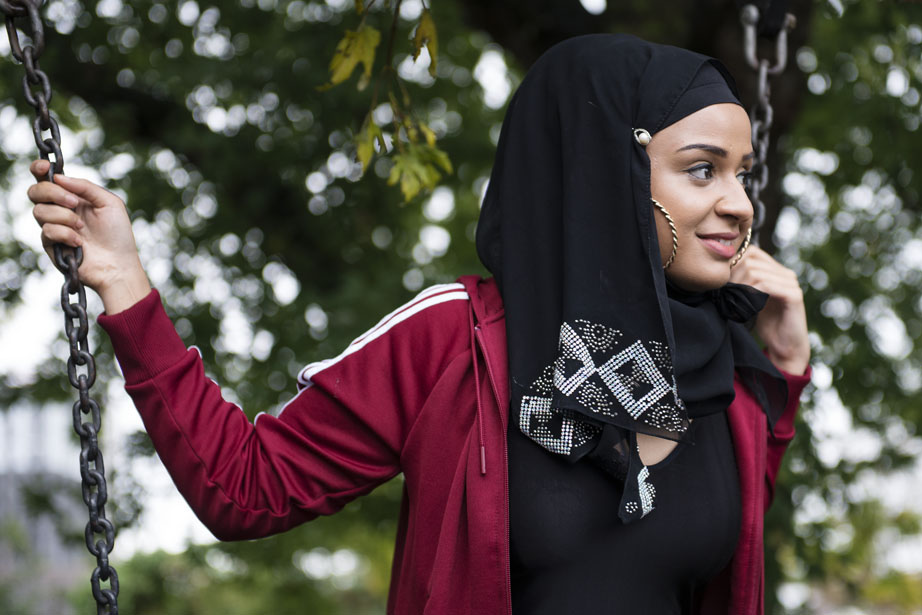
‘Remember: You’re British, but you’ll never be English’. Shahida is a sixteen year old Muslim girl grappling with a bewildering number of conflicting pressures. Along with her family’s expectations of conformity there are the very different demands arising from peer-group friendships, the tough realities of urban street life, and her own somewhat ill-defined need for ‘freedom’. All she knows for sure is that she must get out of Hounslow.
Shahida’s identity crisis is the subject of The Diary of a Hounslow Girl, an astonishingly accomplished comic monologue written and performed by Ambreen Razia. We meet Shahida in her bedroom where she is pacing back and forth liked a caged animal, barely able to contain her frustration. The set is very simple: a door, a bed, a shiny suitcase and some clothes scattered on the floor. It seems that Shahida is packed and ready to go. Or is she? In her hijab, tracksuit and trainers she seems to fit an all-too-easily generalised stereotype, but over the next eighty-five minutes or so we come to understand her as an individual.
Of course, the cultural clash experienced by so-called second-generation immigrants is a familiar issue, one portrayed in works as frothy as Bend It Like Beckham and sometimes explored in rather more depth, as in Monica Ali’s Brick Lane. But The Diary of a Hounslow Girl has its own very particular story to tell, and Razia delivers it to us very directly. Often speaking with machine-gun rapidity, she vividly conveys Shahida’s youthful urgency, throwing herself on her bed in desperation or bouncing on it energetically in remembered moments of joy. One moment she is railing in anger against the unreasonable behaviour of older relatives who expect her to have a nostalgic reverence for a Pakistan that she has never known, and in the next she is excitedly recalling her first kiss. Shahida’s crises are not confined to questions of identity, for she is injured in a violent confrontation on a bus, and she is responsible for a series of embarrassing disasters at her sister’s wedding. There are less frenetic moments, especially when she uses her mobile phone to leave video messages which serve as interludes of quiet reflection, injecting a more serious note amid all the comedic sturm und drang.
Shahida has a boyfriend, Aaron, a tattooed Adonis whose cryptic pronouncements she has found all too seductive. He ‘makes moments of everything’, often delivering his apparently profound insights in rhyming couplets. We see that he is perhaps not what she thinks he is, and as she recalls how she has fallen for his doubtful charms there is a breath-catching, intimate moment when she removes her hijab. The shedding of the scarf is a touching, ambiguous metaphor. Does it represent a hapless surrender, or is it emblematic of a bold rejection of unwanted rules and restrictions?
An expert mimic, Razia is particularly adept at giving cameo portrayals of all the other characters in her story. There’s Leonie and Tash, the pot-smoking, street-wise friends who sneer at any ambitions that stretch beyond the boundaries of Hounslow; and there’s the pompous Indian behind the counter at the local chemist shop, pedantically explaining every detail about all the different kinds of bandage he stocks. Perhaps the most touching and most vivid portrait is that of Shahida’s mother. She is the embodiment of all the traditional values and attitudes against which Shahida is rebelling, yet it may be that they have more common ground than either of them is prepared to acknowledge.
This is a slickly choreographed and beautifully lit production. The set may be simple, but during the course of the show we discover that it has a number of tricks up its sleeve, as when we see Shahida’s video messages projected on the bedroom door. The Diary of a Hounslow Girl is laugh out loud funny, poignant and thought-provoking by turns, and it fully engaged my interest, though I suspect it would have even more impact if about ten minutes were shaved off the running time. Ambreen Razia has created a very likeable and entirely believable character in Shahida. Does she escape from Hounslow and find freedom? It is well worth seeing this very entertaining show to find out. ★★★★☆ Mike Whitton 43th June 2016

